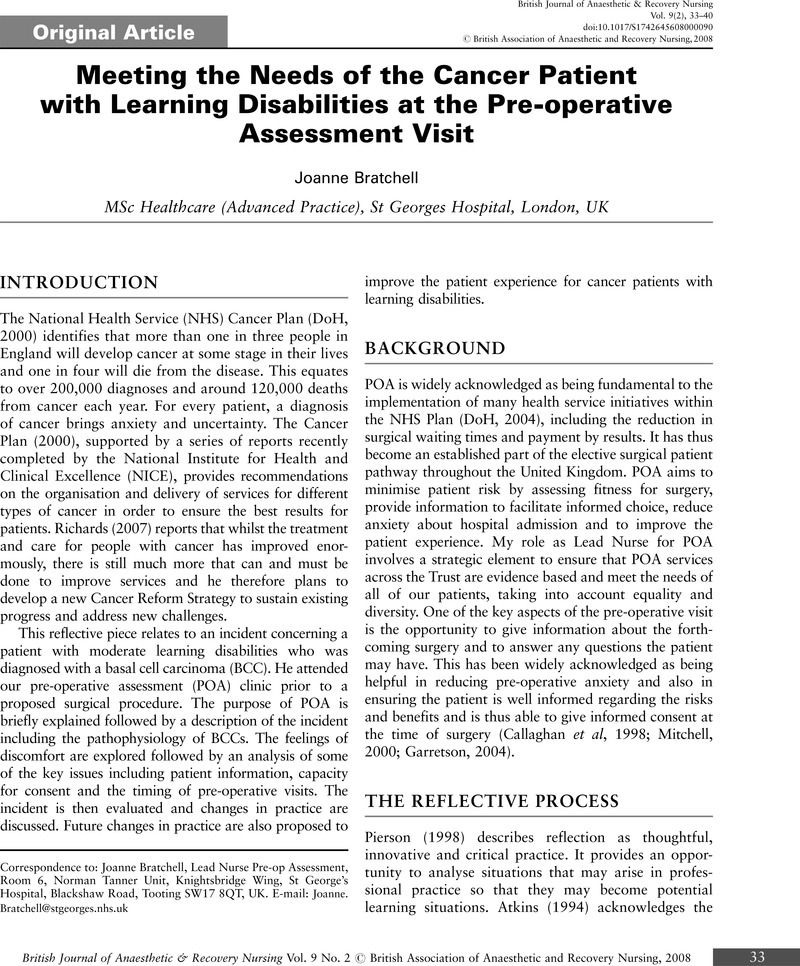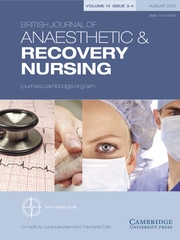No CrossRef data available.
Article contents
Meeting the Needs of the Cancer Patient with Learning Disabilities at the Pre-operative Assessment Visit
Published online by Cambridge University Press: 01 May 2008
Abstract
An abstract is not available for this content so a preview has been provided. Please use the Get access link above for information on how to access this content.

- Type
- Original Article
- Information
- Copyright
- Copyright © British Association of Anaesthetic and Recovery Nursing 2008
References
Boud, D, Keogh, R, Walker, D (eds). Reflection: Turning Experience into Learning. London: Kogan Page, 1998.Google Scholar
Burnard, P. Learning Human Skills: an Experiential and Reflective Guide for Nurses (3rd edn). Oxford: Butterworth Heinemann, 1995.Google Scholar
Callaghan, P, Cheung, Y, Yao, K, Chan, S. The effect of pre-operative information on post-op anxiety, satisfaction with information, and demand for analgesia in Chinese men having transurethral resection of the prostate. Journal of Clinical Nursing 1998; 7 (5): 479–480.CrossRefGoogle Scholar
Department of Constitutional Affairs. Mental Capacity Act. Available at http://www.justice.gov.uk/docs/mca-2005-summary.pdf. Accessed 23 July 2007, 2005.Google Scholar
DoH. A Policy Framework for Commissioning Cancer Services. A report by the Expert Advisory Group on Cancer to the Chief Medical Officers of England and Wales. London: HMSO, 1995.Google Scholar
DoH. NHS Cancer Plan. Available at http://www.dh.gov.uk/en/Publicationsandstatistics/Publications/PublicationsPolicyAndGuidance/DH_4009609. Accessed 07 July 2007, 2000.Google Scholar
DoH (2004). The NHS Improvement Plan – Putting People at the Heart of Public Services. London: TSO. http://www.dh.gov.uk/en/Publicationsandstatistics/Publications/PublicationsPolicyAndGuidance/DH_4084476. Accessed 24 March 2007.Google Scholar
Disability Rights Commission. Equal Treatment: Closing the Gap. Available at http://www.drc.org.uk/Docs/mainreportword_healthfi1.doc. Accessed 19 July 2007, 2006.Google Scholar
Donaghey, V, Bernal, J, Tuffrey-Wijne, I, Hollins, S. Getting on with Cancer. London: Royal College of Psychiatrists, 2002.Google Scholar
Garretson, S. Benefits of pre-operative information programmes. Nursing Standard 2004; 18 (47): 33–37.CrossRefGoogle ScholarPubMed
Gibbs, G. Learning by Doing: a Guide to Teaching and Learning Methods. Oxford: Oxford Brookes University, 1988.Google Scholar
Hardy, S, Woodward, P, Woolard, P, Tait, T. Meeting the Health Needs of People with Learning Disabilities. London: Royal College Nursing, 2006.Google Scholar
Hogg, J, Northfield, J, Turnbull, J. Cancer and People with Learning Disabilities: the Evidence from Published Studies and Experiences from Cancer Services. Worcester: British Institute of Learning Disabilities, 2001.Google Scholar
Jarvis, P. Reflective practice in nursing. Nurse Education Today 1992; 12: 174–181.CrossRefGoogle Scholar
Johns, C. Guided reflection. In: Palmer, A, Burns, S, Bulman, C (eds). Reflective Practice in Nursing: the Growth of the Professional Practitioner. Oxford: Blackwell, 1994.Google Scholar
Johnston C and Slowther A. Consent and Refusal of Treatment. Available at http://www.ethics-network.org.uk/ethical-issues/conscent/ethical%20issues%20consent.pdf, 2003.Google Scholar
Joseph Rowntree Foundation. Adults with learning difficulties’ involvement in health care decision-making. Available at http://www.jrf.org.uk/knowledge/findings/socialcare/029.asp. Accessed 25 May 2007, 1999.Google Scholar
Kendall, S. Being asked not to tell: nurses’ experiences of caring for cancer patients not told of their diagnosis. Journal of Clinical Nursing 2006; 15: 1149–1157.CrossRefGoogle Scholar
Medscape. Understanding skin cancer. Available at http://www.medscape.com/viewarticle/464894. Accessed 06 June 2007, 2004.Google Scholar
Mitchell, M. Nursing intervention for pre-operative anxiety. Nursing Standard 2000; 14 (37): 40–43.CrossRefGoogle ScholarPubMed
NHS Cancer Screening programmes. Equal Access to Breast and Cervical Screening for Disabled women. Available at http://www.cancerscreening.nhs.uk/publications/cs2.pdf Accessed. 25 July 2007, 2006.Google Scholar
Nichols, K. Pyschological Care for Ill and Injured People. A Clinical Guide. Maidenhead: Open University Press, 2003.Google Scholar
Office of Public Sector Information (OPSI). Disability Discrimination Act (1995). London: HMSO, 1995. Available at http://www.opsi.gov.uk/acts/acts1995/1995050.htm. Accessed 19 July 2007.Google Scholar
Patja, K, Eero, P, Livanainen, M. Cancer incidence among people with intellectual disability. Journal of Intellectual Disability Research 2001; 45 (4): 300–307.CrossRefGoogle ScholarPubMed
Perez W. Top ten tips for effective consultation. Available at http://www.intellectualdisability.info/how_to/top_10.htm, 2002.Google Scholar
Pierson, W. Reflection and nursing education. Journal of Advanced Nursing 1998; 27: 165–170.CrossRefGoogle ScholarPubMed
Richards M. Getting it right for people with cancer. Available at http://www.dh.gov.uk/en/Publicationsandstatistics/Publications/PublicationsStatistics/DH_074584, 2007.Google Scholar
Southami, R, Tobias, J. Cancer and its Management (3rd edn). Oxford: Blackwell Science, 1998.Google Scholar
Taylor, BJ. Reflective Practice. A Guide for Nurses and Midwives (2nd edn). Berkshire: Open University Press, 2006.Google Scholar
Thompson, AM, Wells, M. Surgery. In: Kearney, R, Richardson, A. (eds). Nursing Patients with Cancer. London: Elsevier Churchill Livingstone, 2006.Google Scholar
Tuffrey-Wijne I. The palliative care needs of people with intellectual disabilities, 2002.CrossRefGoogle Scholar
Tuffrey-Wijne, I, Bernal, J, Jones, A, Butler, G. Hollins SPeople with intellectual disabilities and their need for cancer information. European Journal of Oncology Nursing 2006; 10 (2): 106–116.CrossRefGoogle ScholarPubMed
Virtual Medical Centre. Cancer of the skin. Available at http://www.virtualmedicalcentre.com/diseases.asp?did=538. Accessed 08 July 2007, 2007.Google Scholar
Wheeler, T. Psychological consequences of malignant melanoma: patients’ experiences and preferences. Nursing Standard 2006; 21 (10): 42–46.CrossRefGoogle ScholarPubMed


